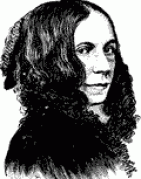Lyric Poem
any short poem that presents a single speaker who expresses thoughts and feelings. Love lyrics are common, but lyric poems have also been written on subjects as different as religion and reading. Sonnets and odes are lyric poems.
Sonnet 43
Elizabeth Barrett Browning
How do I love thee? Let me count the ways.
I love thee to the depth and breadth and height
My soul can reach, when feeling out of sight
For the ends of Being and ideal Grace.
I love thee to the level of everyday’s
Most quiet need, by sun and candle-light.
I love thee freely, as men strive for Right;
I love thee purely, as they turn from Praise.
I love thee with the passion put to use
In my old griefs, and with my childhood’s faith.
I love thee with a love I seemed to lose
With my lost saints,—I love thee with the breath,
Smiles, tears, of all my life!—and, if God choose,
I shall but love thee better after death.
Elizabeth Barrett Browning’s sonnet 43, “How Do I Love Thee? Let Me Count the Ways”, is possibly her most famous poem. She’s basically explaining to her lover that she can not possibly describe how much she loves him. “I love thee to the depth and breadth and height my soul can reach, when feeling out of sight for the ends of Being and ideal Grace.” She loves him so much, and she believes that she will love him even more after she has passed away, “and, if God choose, I shall but love thee better after death”. This sonnet is classified as a lyric poem because it presents a single speaker (Browning) who expresses thoughts and feelings.

"A woman is always younger than a man at equal years." ~Elizabeth Barrett Browning
Elizabeth Barrett Browning

Elizabeth Barrett was born at Coxhoe Hall, Durham, England. Elizabeth was educated at home, learning Greek, Latin, and several modern languages at an early age. In 1819, her father arranged for the printing of one of her poems (she was 13 at the time.)
In 1821, Elizabeth injured her spine as a result of a fall. When her brother died in 1838, she seemingly became a permanent invalid. She spent the majority of her time in her room writing poetry. In 1844, Robert Browning wrote to Elizabeth admiring her Poems. He continued to write to her and they were engaged in 1845.
Elizabeth's father disapproved of the courtship and engagement. In 1846, Elizabeth and Robert were secretly wed. Soon the couple ran off to Italy where Elizabeth's health improved. She continued to live in the villa of Casa Guidi for the remainder of her life.
In 1850, Elizabeth's best known book of poems was published Sonnets from the Portugese. They are not translations, but a sequence of 44 sonnets recording the growth of her love for Robert. He often called her "my little Portuguese" because of her dark complextion.
Elizabeth's poems have a diction and rhythm evoking an attractive, spontaneouse quallity though some may seem sentimental. Many of her poems protest what she considered unjust social conditions. She also wrote poems appealing for political freedom for Italy and other countries controlled by foreign nations.
In 1861, Elizabeth Barrett Browning died at the age of 55. Her son, born 1849, and husband returned to England after her death.
(http://www.cswnet.com/~erin/ebbbio.htm)
